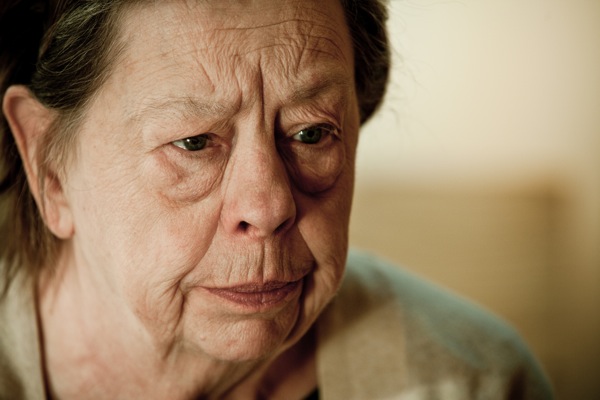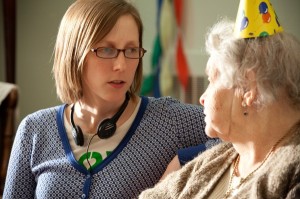
It could be tricky for a team of younger filmmakers to make a good film about their elders, but a pair of up-and-coming Cape Breton filmmakers rose to the challenge spectacularly. The short film Rhonda’s Party marks a big directorial debut for Ashley McKenzie, who had fellow New Waterford artist Nelson MacDonald on board as producer. Ever since Rhonda’s Party made its debut at the Montreal World Film Festival in early September, it has been collecting critical acclaim as a stand-out film at every festival that screens it. The film won best Canadian Short at the YoungCuts film festival in Montreal, which selects the top 100 films by filmmakers 25 years of age and younger from around the world. At the Atlantic Film Festival in Halifax, Rhonda’s Party caught the eye of The Coast reviewer Sean Flinn as a standout entry. It was also selected for the St. John’s International Women’s Film Festival. And now, finally, Rhonda’s Party is making its way to Cape Breton, where it will be screened on Thursday, November 18 at the Cape Breton Film Series, before the feature presentation Get Low.
It’s little wonder that Rhonda’s Party got so much attention. It is a rare, sensitive glimpse into a life-changing moment for a woman in her twilight years. Nova Scotia actor Marguerite McNeil (Marion Bridge, New Waterford Girl, The Divine Ryans, The Scarlet Letter, My Bloody Valentine), originally of Glace Bay, stars in the title role as the resolute nursing home resident Rhonda. The audience witnesses the moments as Rhonda plans for her best friend’s birthday party, only to be interrupted by a sudden tragedy. The film shows the touching, surprising ways that she starts coming to terms with things.
Rhonda’s Party was made through the Atlantic Filmmakers Co-operative’s Film 5 program, which provides new filmmakers the opportunity to make a short film with sponsorship and mentoring from experienced film industry professionals. MacDonald explained that the program is a huge jumpstart for many filmmakers’ careers. “We knew about the program, and it’s always something that I’ve wanted to go through, that Ashley wanted to go through,” he explained, mentioning that many notable Nova Scotian filmmakers went through the program, including Thom Fitzgerald (The Hanging Garden) and Andrea Dorfman, the latter responsible for the viral hit “How to be Alone”.
Each Film 5 production is centered on a core team of a director, writer, and producer. Quebec-based writer Christine Comeau, whom McKenzie met on a previous film project, wrote the Rhonda’s Party screenplay. It was a story McKenzie and MacDonald found original and compelling enough to form a team to apply for Film 5 support.
What made Comeau’s script special for the pair was that there weren’t many films made about the lives of older people. “The nursing home setting…really interested me,” explained McKenzie. “I felt like it was ripe for examination. It’s something you don’t see on screen a lot.” MacDonald subsequently joined the project as a producer for similar reasons. “I’m more attracted to grittier stories than Rhonda’s Party,” admitted MacDonald. “But one of the things that struck me was there’s not very many films made with older characters in key roles, especially older characters who aren’t just caricatures.”

Indeed, Rhonda’s character is given the dignified treatment of being a realistic, three-dimensional human being with nuance and complexity. McNeil gives her character a strong voice and, through little more than a furrowing of her brow or widening of her eyes, communicates more depth than some feature length films. “I wanted there to be a history immediately communicated just by looking at her,” said MacKenzie. As MacDonald explained, getting McNeil interested and involved with the project was a big first victory. “Once we had Marguerite on board, that helped get other people on board. Everybody in the film community in Halifax knows her and likes her,” he enthused.
As a film about aging, perhaps the most important achievement for this film is that Rhonda’s Party doesn’t exploit the fear, pity, or other cultural hang-ups we might have around aging, death and nursing homes. The admittedly stark, clinical atmosphere of the home is skillfully captured with a realism that doesn’t interfere with the humanity and dignity of the characters. We’re drawn into their world in a way that makes them relatable. Achieving this sort of empathy was no accident; McKenzie explained that the team made sure to do their homework by meaningfully engaging with the senior citizens who live with experiences like Rhonda’s. That included volunteering at the Northwood Manor in Halifax, and working closely with the Northwood Players, an acting troupe of seniors who live in the neighbourhood and who play the background performers in Rhonda’s Party. “It just seemed silly for us [as] young adults—to try to tell the story without having, you know, immersed ourselves in that world a bit and understand the issues that they’re dealing with every day,” McKenzie explained. “Those issues certainly…came up time and time again when we were meeting with the players or volunteering and what they have to deal with, whether it’s death or loss of mobility, these challenges.” Whatever lessons the young filmmakers may have learned during their Film 5 experience, it is this self-reflection, diligence, and respect for the experiences of others that will put their films in a class above many others.
Rhonda’s Party will be screened at Empire Theatres on Prince Street in Sydney Thursday night, before the feature presentation of Get Low (starring Bill Murray, Robert Duvall, Sissy Sapcek). Showtime is 7pm. Tickets are $9 regular admission, $6 for students. Seating is limited. For more information, visit cbfilms.ca, and rhondasparty.ca.

